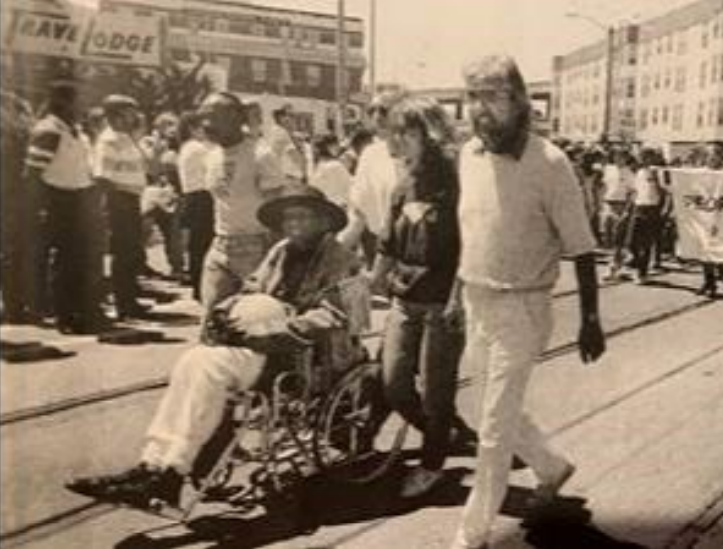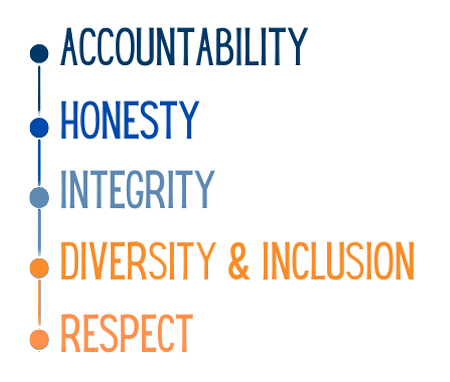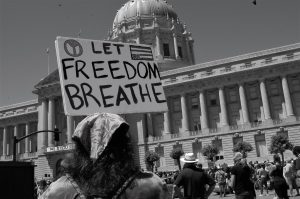For decades, AIDS Emergency Fund (AEF), the predecessor to PRC’s Emergency Financial Assistance (EFA), was guided by the expertise of Lee Harrington (will link to Lee’s blog post), who retired in December 2021 after more than 24 years in the role. Before he left, however, Lee single-handedly chose his successors to ensure that the program’s clients would continue receiving the same level of support and compassion they had become accustomed to. Last spring, we sat down with Martin Muneton, EFA’s Director of Client Services, and Evelyn Castro, EFA’s Client Services Manager, to learn more about the next generation serving EFA’s clients.
It’s easy to see why Lee chose Martin and Evelyn to take over the reins of EFA, as both came to PRC with a deep history of supporting people living with HIV/AIDS. Although the pair were only three months into their new roles at the time of the interview, the connection between the two of them exuded a great rapport and confidence, traits that will certainly help them excel in continuing EFA’s legacy. While it will understandably take time for the duo to master the inner workings of EFA as they transition it into a new era, both agreed they have a good understanding of areas that could benefit from enhancements, and they have the drive to elevate the program so that clients remain the top priority.
Getting to know the new EFA team is nothing short of a treat. The duo shares passions for staying active, competitive, and sociable as a means of stress relief. Martin has a history of participating in triathlons and keeps fit by going to the gym after work. On weekends he enjoys eating well, hanging out with his mates, and spending time with his boyfriend. Evelyn enjoys team sports, being outdoors, hiking, and riding dirt bikes and four-wheelers with her family on the weekends. Evelyn is a first-generation San Francisco native with El Salvadorian and Mexican heritage, and Martin grew up in London. Both feel a powerful sense of pride in giving back to the community.
How did you both end up working at PRC?
Martin: “I’ve known and worked with Lee Harrington and PRC for many years. We’re part of the same service provider community. I’ve been working with populations with HIV and with Lee since 1997 when he essentially conceived Emergency Financial Assistance, previously known as AIDS Emergency Fund. It was quite flattering that he saw me as a suitable choice to continue his legacy. Quite frankly, I’ve got some big shoes to fill.”
Evelyn: “I came from a case management position with Catholic Charities after eight years as their accountant. When I saw the posting for EFA, it felt like the perfect marriage of my skill sets. I really like talking to people too, so I decided to take a chance. I feel lucky to have ended up here. Honestly, it feels too good to be true!”
How did you two meet?
Martin: “I met Evelyn while working at Catholic Charities. She was volunteering at the incredibly young age of 14. Eventually, she started working there as well, and then she ended up in my department and we became colleagues. When I think of how we transitioned into PRC together, it’s just bonkers!”
How has the transition been?
Martin: “It’s a familiar feeling here. I have a long history of assisting clients with HIV with subsidies. Because of my past collaborations with PRC and working with the staff here for many years, it’s been a smooth and easy transition. There’s still a learning process, however, and some aspects have been challenging. The hardest thing is that for some clients, it can be shocking for them to realize that they’re dealing with a new person. They don’t know what to expect. Fortunately, we know many of our clients from our past jobs and have already built a rapport with them. That makes things easier. They already trust us. But we don’t know them all.
“Lee sustained this program for many years, and quite effectively. But there are processes that can be improved. We hope to implement an online system where clients can submit documents, check balances, and access renewal dates. Not all clients will be able to transition to such a sophisticated system, nor do all of them have access to the technology to do so, but this would be an incredibly helpful tool for those who can. We have a lot of ideas, but they will take time to design and implement.”
Evelyn: “Anytime you start a new role there’s a period of transition. It takes time to settle in. But this is work that we are familiar with, and things are going well. The challenge is when we are unable to assist a client, either because they’ve exhausted their maximum for the year, or they are unable to provide the required documents we need for our funding. Most clients understand that these requirements are in place to protect the longevity of the program. But we want to help everyone, so in these cases, we explain that if we break the rules, then the system breaks down, and when they really need us, the funds won’t be there for them. We also refer clients outward when we know of other sources of funding available to them. We never simply turn a client away. If a client is unable to provide the necessary documents or has reached their benefit limit for the year, we tell them that unfortunately, we can’t help them, but we encourage them and offer whatever tools we can for them to help themselves. This way they leave knowing that we are doing everything we can to assist them. Sometimes the only thing you can do is be attentive to their needs and listen to their story.”
It must be hard to tell a client you are unable to provide assistance.
Martin: “Until we find an infinite source of funds, we sometimes have no choice. We do our best to provide referrals and information for additional services in these cases, and we work with them to make sure we’ve covered every available avenue. The best thing we can do when this happens is to be attentive to their needs and take the time to listen to their story. If we kindly and in a caring way tell someone we are not able to provide services but also provide options, resources, and guidance, they will at least feel heard and comfortable returning when they do meet the program’s requirements.”
What aspects of your job do you find rewarding?
Martin: “The fact that we can continue assisting so many clients per year is what I find rewarding. Evelyn and I have both seen the conditions in which many of our clients live because in our last job we checked in on them to see how they were doing. These clients really need our help. San Francisco is incredibly expensive, especially for someone who is already struggling financially. Any help is essential for them. They’re just trying to survive, like most of us.”
PRC has several wrap-around services to support clients: Workforce Development, Legal Advocacy, and Residential Facilities. Have you found that you are able to refer clients to other PRC programs and move them along the continuum of care?
Evelyn: “There are a few cases that have stuck with me. For one client, we were able to secure a two-week hotel voucher, which allowed them to stabilize. That was what they needed to complete the required paperwork, and then we were able to get them into rental housing. We were even able to assist with moving costs.
“Another client, a San Francisco native, moved back after living overseas for a few years. They thought they had enough savings to get situated but quickly learned that was not the case. After ending up in shelters, they came to us for help, and we were able to get them a voucher for a week in a hotel. At the same time, we connected them with our Legal Advocacy team, who were able to help secure Social Security Insurance benefits. This person has since moved into one of our transitional residential facilities, and we are currently working to help cover program fees.
“A frequent situation we encounter is clients who have no income and have been told that they don’t qualify for assistance. When asked if they have spoken with anyone that can help them navigate the legal portions of why they were denied, oftentimes they haven’t, and then we connect them with a member of our Legal Advocacy team. It’s a great feeling when we see them again after they’ve utilized the resources we’ve recommended. So yes, we frequently refer clients to internal and external programs, and do our best to help them achieve positive outcomes.”
Martin: “We frequently interact with clients who are somewhat content with what they’ve got and don’t necessarily have the need or desire to move on to something else. They perceive that if they move on to something else or go back to work, they will lose their subsidies or benefits. They’re afraid, they are also getting older, and their health isn’t improving. So, these individuals would prefer to remain where they are. It may not be much, but they feel stable. Imagine trying to rejoin the workforce after a 20- or 30-year hiatus when you’re in your 50s, and the world has changed dramatically. It’s incredibly difficult and terrifying. For those who are long-time survivors, it’s hard for them to transition into something new, and many don’t succeed when they try. Others may want to venture into something different, and we encourage that.
“Having worked with HIV clients since the 1990s, I’ve witnessed many clients cycle in and out of homelessness. They typically have multiple diagnoses, and it’s rarely HIV that keeps them on the streets. Most times it’s substance use compounded with mental health issues, and these people need far more than a single yearly grant to stabilize. Substance addiction really does take over their entire lives, their volition, and their willingness to change. That’s why it’s so important for our approach to be multifaceted, comprehensive, and fair as we assess our clients’ needs and challenges in order to refer them to the most appropriate services.”
Do you have any insights as to how we as a society change this?
Martin: “It’s foundational, and there aren’t enough support services to match the growing need. Incarcerating a person for substance abuse is not the solution. They need support and treatment, and there aren’t enough support services for mental health issues. We try to mitigate the pain and the lack of services, but it will never be enough.”
Having personally witnessed these situations, and for many decades, what motivates you to continue and believe you can make change?
Martin: “It’s the individual people that you can help. If it’s at least one person, that’s enough. Of course, we want to help more people, but the satisfaction comes from knowing that we’re helping as many people as we can. We may not be able to change the whole world or even the whole City of San Francisco, but we act in good faith. We do what we can within our means and resources and stay humble about it knowing that each of us is only one person.”
Evelyn: “We take things case by case. The first time I meet with a client, perhaps they were crying and upset toward me because they needed a hotel voucher. Then they get the voucher and when they come in the next time, they’re happy, and this time they need assistance with securing a lease for housing. Those little moments that we share are the client’s low and the client’s high, and we got to experience them together. These little moments when you realize that you were a part of this client’s meaningful change, there’s no better feeling than that.”
Martin: “When you act in good faith and show that you care, clients know it. If you are dismissive, they are going to see that too. It’s important that we listen to their story, and if we have to say no to them, we do it in a kind, compassionate, and attentive way. They appreciate that. It makes a difference. It doesn’t take much to be kind.”
If you could tell all of society something about the work being done that they might not know, what would that be?
Martin: “Don’t make assumptions. We all have a story to tell. Learn how to communicate and understand each other and be kind to each other. And this really starts at home.”
Evelyn: “Living in San Francisco, your comfort is circumstantial. The comfort we can provide for these clients with just $500 really opens your eyes to everything we put value in. Our comfort comes from our everyday work on ourselves, and how we can work within society. When we’re cut off from those things due to mental health issues or limited resources, we lose our comfort. Appreciate what you have and do everything you can to make sure your comfort stays at your desired level, and help others when you can. All it takes is one lost job for you to lose your home or prevent you from being able to afford food. It’s those little things that we forget to enjoy every day, so don’t take them for granted.”
Lee Harrington must be proud to know that his chosen successors are carrying on with the same level of passion and care that he showed his clients. PRC is certainly happy to have them as stewards ushering in a new era of services.
Update:
PRC has changed the delivery of EFA services from a drop-in model to an appointment-based system. This adjustment allows for efficiencies that the drop-in model did not provide, both shortening the time clients spend waiting at the PRC offices to meet with an EFA service provider and reducing the need for multiple visits as clients are informed of the documentation needed for their specific circumstances prior to their appointment. Reducing the time needed to intake each client has allowed for quicker access to emergency funds and an increase in the number of clients that can be served.
Additional information and the EFA Client Checklist are available below.
EFA Client Checklist (English and Spanish)
EFA Brochure (English)
EFA Brochure (Spanish)
If you or someone you know would like to schedule an appointment with EFA, please call or e-mail:
If you’ve enjoyed learning about Evelyn and Martin and the impactful services they’re providing to EFA’s clients, please consider making a donation to support their work. You can learn more about all of PRC’s services on our website.






